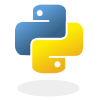CSC111 Lab 4 2015b
--D. Thiebaut (talk) 15:25, 27 September 2015 (EDT)
Contents
Lab #4
<showafterdate after="20150930 12:00" before="20151231 00:00">
Work on this lab is pairs. The material in this lab deals with slicing and indexing. You will notice that the problems are getting more challenging. This is because we are learning enough Python to solve more and more complex puzzles. So it is important to practice solving problems.
String Slices
- Use Python in interactive mode and try the following Python statements. Try to figure out the answers to the questions.
Python 2.6 (r26:66714, Nov 3 2009, 17:33:38)
[GCC 4.4.1 20090725 (Red Hat 4.4.1-2)] on linux2
Type "help", "copyright", "credits" or "license" for more information.
>>> a = "H:/English103/paper1.doc"
>>> a
>>> len( a )
>>> a[0]
>>> a[2]
>>> a[-1]
>>> a[-2]
>>> a[0 : 2]
>>> a[3 : 13]
>>> a[-3 : -1]
>>> a[-5 : -1]
>>> a[-5 : ] (no, I didn't forget the second number!)
>>> a[ : 3] (and no again, I didn't forget the first number!)
>>> a[3 : -3]
>>> b = "C:/My Documents/paper2.htm"
>>> c = "Smith College"
>>> for i in range( 5 ):
print( c[0:i] )
>>> for i in range( 5 ):
print( c[i:20] )
You will have discovered that both a and b contain strings representing the name of files in a computer. < br />
Challenge #1 |
- What is the string slice that will return the drive information for a (i.e. 'H:')? If you slice b the same way, do you get the drive information as well? replace a by b, does your statement still return the drive for b?
- Example of output
H:/English103/paper1.doc --> H C:/My Documents/paper2.htm --> C
Challenge #2 |
- What is the slice that will return the extension only of a or of b (i.e. doc or htm)?
- Example of output
H:/English103/paper1.doc --> doc C:/My Documents/paper2.htm --> htm
Challenge #3 |
- Once you have figured out the answers to Question 2, write a simple Python program that asks the user for a file name, such as the ones we used for a or b above, and that prints out the same file name back, but with the extension replaced with "txt".
- Example
- Filename? C:/My Documents/paper02182010.doc
- C:/My Documents/paper02182010.txt
Challenge #4 |
- Write a program that asks the user for her first name and her last name, and outputs a computer account name, that is made of the first letter of first name, plus the last name. (We won't worry about whether we have upper- or lower-case in the output.)
- Example
- First name? Allie
- Last name? Baba
- Your computer account name is: ABaba
Challenge #5 |
- Write a program that asks the user for her first and last names, and display a "triangle" with the names, as shown below:
Please enter your first name: Maria
Pleaes enter your last name: LUCE
M
Ma
Mar
Mari
Maria
MariaL
MariaLU
MariaLUC
MariaLUCE
Indexing through a List
This is an example taken from Section 5.3 in Zelle. Add the code below to your current program.
monthNames = ["January", "February", "March", "April", "May", "June", "July", "August", "September", "October", "November", "December"] month = eval( input( "Which month were you born in, as a number (1 for January)? " ) ) print( "You were born in", monthNames[ month-1 ] )
Challenge #6 |
- Write a program that prompts the user for the day she was born, the month she was born, as a number, and the year she was born. Your program will then output the birth date with the month as a word.
- Example
Day you were born? 14 Month you were born? 2 Year you were born? 1990 You were born on February 14, 1990
Challenge #7 |
- Modify your solution for Challenge 6 so that it outputs the first 3 letters of the month, only. You cannot modify the list of months. In other words, the only list you can have in your program is
monthNames = ["January", "February", "March", "April", "May", "June", "July", "August", "September", "October", "November", "December"]
Splitting Strings
- Use the Python Shell to explore the split() method for strings.
>>> phrase = "The quick red fox jumped over the fox"
>>> phrase
>>> words = phrase.split()
>>> words
>>> words[0]
>>> words[-1]
>>> words[0:2]
>>> words[3]
>>> for i in range( len( words ) ):
print( words[ i ] )
>>>
>>> for i in range( len( words )-1, -1, -1 ):
print( words[i] )
>>> for word in words:
print( word )
>>> dwarves = "Doc, Grumpy, Happy, Sleepy, Bashful, Sneezy, Dopey"
>>> dwarves
>>> names = dwarves.split( ", " )
>>> names
>>> for name in names:
print( name )
>>>
Challenge #8 |
- Write a program that asks the user to enter a sentence made of words separated by spaces. Your program will then output the words, one on each line, right justified in a field of 30 characters.
- Example
Enter a sentence: The quick red fox jumped over the dog The quick red fox jumped over the dog
String Methods
We have already seen a string method: the format() method, used with the {...} formatting satatement.Chapter 5 introduces a few more.
The methods are all documented at this page: https://docs.python.org/3/library/stdtypes.html#string-methods. Open this page and refer to it while you are working on this prep. lab.
Use the python shell to test out different string methods:
center()
One of the string methods is the center function.
Use it to center the title "computer SCIENCE 111" between two lines of 45 dashes. Use a variable called myTitle to store the string.
myTitle = "computer SCIENCE 111" print( 45*"-" ) print( myTitle.center( 45 ) ) print( 45*"-" )
capitalize()
Instead of printing the variable myTitle, print myTitle.capitalize( ) and see what happens.
upper()
Use upper() instead of capitalize(). Observe the new output.
title()
Same exercise, but with the title() method.
Challenge #9 |
- Write some Python code that will ask for your name, then your last name, and will print both of them centered between two lines of 60 dashes. Make your program capitalize the first letter of each word.
- Example
your first name? alexAndra
your last name? SMITH
------------------------------------------------------------
Alexandra Smith
------------------------------------------------------------
Replacing substrings in a string
To replace a substring of a string (or a word in a sentence), all you need to do is to use the replace() method.
# we define a multi-line string with triple-double-quotes sentence = """Strength is the capacity to break a chocolate bar into four pieces with your bare hands - and then eat just one of the pieces""" # display original string print( "Original sentence =", sentence ) # replace chocolate by carrot sentence = sentence.replace( "chocolate", "carrot" ) # display resulting string print( "New sentence = ", sentence )
Try it and replace the word "piece" by the word "chunk" in the same sentence, so that now you're breaking carrots into chunks.
Count()
Read the documentation on the method count() and write some statements that output the number of times the word "piece" appears in sentence using the count() method.
Strip()
Read the documentation about the method strip() and use it to allow you to print the lines below left aligned.
listOfStrings = [ " But then, shall I never get any older than I am now? ", " That'll be a comfort, one way -- never to be an old woman -- ", " but then -- always to have lessons to learn! ", " Alice " ]
</showafterdate>
Moodle Submission
Challenge #10 |
- Write a program called lab4.py, and containing a main() function, that prompts the user for
- her first name
- her last name
- her date of birth, in the form mm/dd/yyyy
- The program then should print a blank line (important for the Moodle grader!)
- The program then outputs
- the first and last name nicely capitalized, left aligned, on the same line, with a space in between,
- the date of birth, in the form dd month yyyy, where month is the actual name of the month (e.g. January, if the user entered 01 for the first 2 digits of her birth date),
- her computer account, all lowercase, formed by concatenating the first letter of her first name and her last name, and
- a "triangle" of her name (as is explained in the video lecture for this Monday)
- Example
First name? ALEX Last name? ANDRA date of birth (mm/dd/yyyy)? 02/03/2000 Name: Alex Andra DOB: 03 February 2000 Account: aandra A Al Ale Alex AlexA AlexAn AlexAnd AlexAndr AlexAndra
- Submit the program to Moodle, in the Lab 4 PB 10 section. Both you and your lab partner must submit a copy of the program.
<showafterdate after="20151003 1:00" before="20151231 00:00">
Solution Programs
# lab4Prep.py
# D. Thiebaut
# Solution program for Lab4/prep
# MAKE SURE YOU TRY THE CHALLENGES BY YOURSELF, ON YOUR OWN,
# BEFORE YOU LOOKUP THE SOLUTION.
#
def challenge1():
b = "C:/My Documents/paper2.htm"
a = "H:/English103/paper1.doc"
drive = a[0:1]
print( a, "-->", drive )
drive = b[0:1]
print( b, "-->", drive )
def challenge2():
b = "C:/My Documents/paper2.htm"
a = "H:/English103/paper1.doc"
extension = a[-3:]
print( a, "-->", extension )
extension = b[-3:]
print( b, "-->", extension )
def challenge3():
fileName = "C:/document/CSC111_finalExam.sol" # input( "File name? " )
fileNameNoExt = fileName[0:-3]
newFileName = fileNameNoExt + "txt"
print( fileName, "-->", newFileName )
def challenge4():
fName = "Allie" #input( "Your first name? " )
lName = "Baba" #input( "Your last name? " )
account = fName[0] + lName
print( fName, lName, "your computer account is", account )
def challenge5():
fName = "Maria" #input( "Your first name? " )
lName = "LUCE" #input( "Your last name? " )
fullName = fName + lName
noChars = len( fullName )
for i in range( 1, noChars + 1 ):
print( fullName[0:i] )
def challenge6():
monthNames = ["January", "February", "March", "April", "May", "June", "July", "August",
"September", "October", "November", "December"]
day = 14 #eval( input( "Day? " ) )
month = 2 #eval( input( "Month (as a number)? " ) )
year = 1990 #eval( input( "Year? " ) )
monthString = monthNames[ month ]
print()
print( "You were born on {0:1} {1:1}, {2:1}."
.format( day, monthString, year ) )
print()
def challenge7():
monthNames = ["January", "February", "March", "April", "May", "June", "July", "August",
"September", "October", "November", "December"]
day = 14 #eval( input( "Day? " ) )
month = 2 #eval( input( "Month (as a number)? " ) )
year = 1990 #eval( input( "Year? " ) )
monthString = monthNames[ month ]
print()
print( "You were born on {0:1} {1:1}, {2:1}."
.format( day, monthString[0:3], year ) )
print()
def challenge8():
sentence = "the quick fox jumped over the lazy dog" #input( "Enter a sentence: " )
words = sentence.split( )
for word in words:
print( "{0:>30}".format( word ) )
def challenge9():
fName = "Alexandra" #input( "Your first name? " )
lName = "Smith" #input( "Your last name? " )
name = fName + " " + lName
bar = 60 * '-'
print( bar )
print( name.center( 60 ) )
print( bar )
def main():
challenge1()
challenge2()
challenge3()
challenge4()
challenge5()
challenge6()
challenge7()
challenge8()
challenge9()
main()
Moodle Challenge 10
# Challenge10.py
# D. Thiebaut
def main():
# input
fName = input( "First name? " )
lName = input( "Last name? " )
dob = input( "date of birth (mm/dd/yyyy)? " )
print()
# months names
months = [ "XXX",
"January", "February", "March", "April",
"May", "June", "July", "August",
"September", "October", "November", "December" ]
# output
print( "Name: ", fName.capitalize(), lName.capitalize() )
day = dob[3:5]
month = dob[0:2]
year = dob[6: ]
print( "DOB: ", day, months[ int( month ) ], year )
account = fName[0] + lName
print( "Account: ", account.lower() )
fullName = fName.capitalize() + lName.capitalize()
for i in range( len( fullName ) ):
print( fullName[0:i+1] )
main()
</showafterdate>









